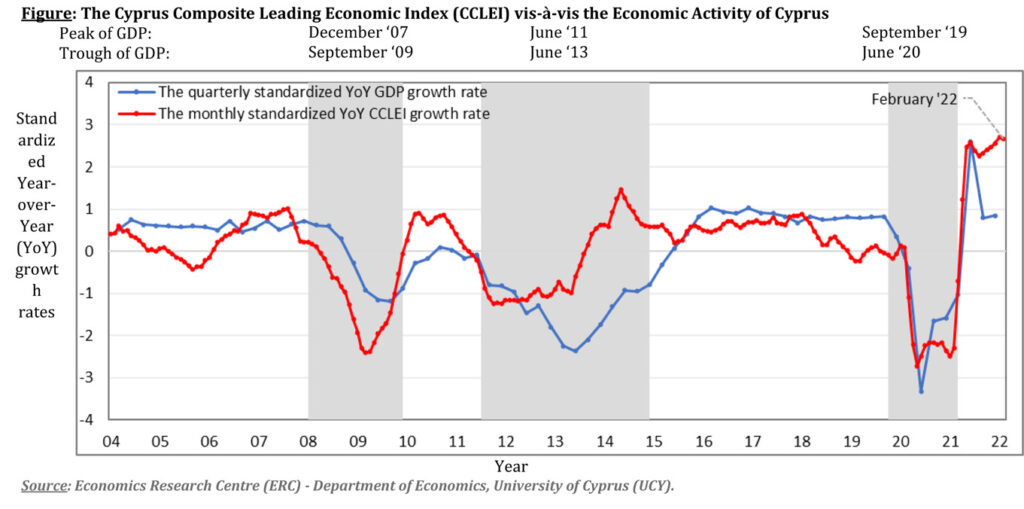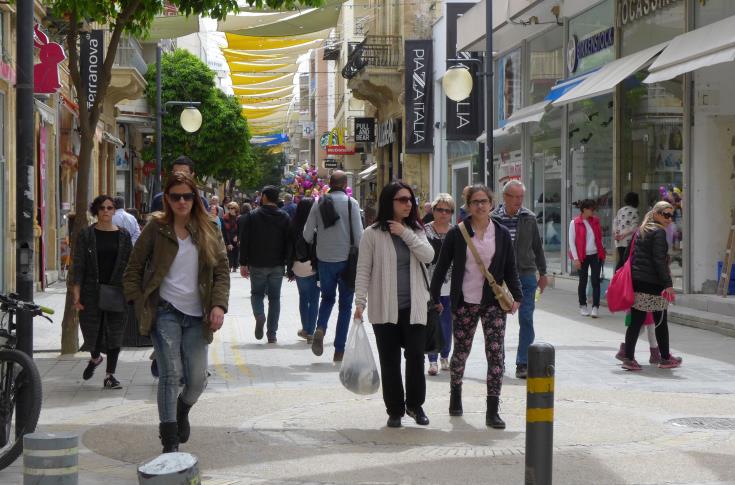A leading indicator that serves as an early warning signal for changes in Cyprus economic activity, saw a year-on-year growth in February, prior to the full scale of the current crisis with the situation in Ukraine and sanctions “partially reflected” in the data.
However, economic indicators and business confidence surveys are expected to deteriorate as a result of rising energy costs, due to harsher sanctions imposed in crude oil and natural gas exporter Russia, just as Cyprus and other economies were starting to recover from the impact of the coronavirus.
The Cyprus Composite Leading Economic Index (CCLEI) compiled by the Economics Research Centre of the University of Cyprus recorded a year-over-year increase of 15.0% in February, reaching a level of 111.8, after year-over-year increases of 15.2% in January 2022 and 14.4% in December 2021, based on recent and revised data.
The CCLEI authors said “the confidence in all business sectors, especially in the services sector, which strengthened in February 2022 compared to last year, led to the strengthening of the Economic Sentiment Indicator (ESI) in the euro area and in Cyprus.
“Moreover, the consumption and trade sector has a positive effect on the CCLEI and domestic economic activity, with the value of credit card transactions and the volume of retail sales still showing, according to preliminary data.
“At the same time, the temperature-adjusted volume of electricity production, the total number of property sales contracts, as well as the tourist arrivals, according to preliminary data, continue to exert a positive effect on the CCLEI, recording an increase in February compared to last year.
“In contrast, the significant increase in the Brent crude oil price in February puts the brakes on the further CCLEI growth.”
Partially reflect ongoing challenges
The report, supported by Hellenic Bank, concluded that the decelerating growth rate of the February CCLEI reflects, in part, the ongoing pandemic challenges, rising energy costs, and growing geopolitical tensions.
“The war in Ukraine and the international sanctions are partially reflected in February’s economic data and consequently in the CCLEI,” the authors said.

Cyprus expects to be hit the hardest in the sectors of tourism and energy supplies, a senior government official told the EU finance ministers’ meeting (Ecofin) in Brussels, echoing warnings from rating agencies over the fallout from the war in Ukraine and sanctions on Russia.
Permanent Secretary Yiorgos Panteli, representing Finance Minister Constantinos Petrides, said that the sanctions imposed on Russia are expected to bring on challenges for the island’s tourism and energy sectors.
Cyprus’ significant links with Russia have increased the downside risks to otherwise strong medium term economic prospects for the island, rating agency DBRS said in a commentary on Monday, adding that sanctions on Russia could cost, as it noted that “the main transmission channels for Cyprus are through tourism revenues and higher energy prices”.
The rating agency noted that Russia has been the second largest source market for Cyprus since 2007 and the main market in 2021, accounting for 27% of total tourist arrivals.
DBRS Morningstar estimates that Cyprus stands to lose 1.5-2.0% of GDP in 2022 if the airspace closures remain in place for the whole year.
At the same time, Marios Tsiakkis, the general secretary of the Cyprus Chamber of Commerce and Industry, told the Financial Mirror that an increase seen in the island’s trade deficit in January was because of rising prices internationally.
Tsiakkis explained that prices of goods have been pushed up due to high demand of raw materials, as economies reopen following relaxations of COVID-19 restrictions around the world.
The business chamber’s general manager explained that, “stakeholders expect to see the trade deficit grow further if a surge in petrol prices is not brought to a halt”.
The war in Ukraine is currently pushing fuel prices up as Russia’s energy resources have been pulled from the market due to sanctions.
On Sunday, the price of crude oil had reached 135 dollars a barrel, but has since fallen to just above 100 dollars on Thursday.
Retail prices at petrol stations have seen 95 octane rise by 20c to the €1.30-1.40 range, while diesel has been galloping all week, peaking at €1.70 Friday morning, despite a brief respite last week when the government partly reduced the 46c consumer tax on all fuels.










